
What are policies to help people who use methamphetamine (meth) to be safer?
There are many drug policies we can pass at the local, state, and federal level to help people who use methamphetamine to be safer.
- Invest in addiction services. A full range of addiction services—including counseling, long-term treatment, and recovery housing—should be available to individuals. Personalized support reduces overdose risk and improves recovery chances.
- Expand contingency management services. Contingency management is a highly effective treatment that involves providing incentive for behavioral outcomes aligned with treatment goals. It is the most effective treatment for stimulant use disorders, but it is rarely available due to various structural barriers.
- Expand research into stimulant addiction medications. Unlike for opioid use disorders, there are no approved medications for treating stimulant use disorders. More research and resources are needed to develop potential medications and other treatment approaches for stimulant use disorders.
- Address demand (root causes of methamphetamine use). Methamphetamine offers euphoria and alertness — many people use it to cope with physical or emotional pain. Ensuring people have access to housing, community, mental health services, and jobs can help address why people are using.
- Increase access to sterile supplies that reduce disease transmission. Access to sterile needles, syringes, and smoking kits reduces the transmission of infectious diseases. These supplies should be widely available to people who use drugs, and their use and possession should not be criminalized.
- Expand research and services for polysubstance use. Many people with substance use disorders use multiple drugs. Research and addiction services must account for polysubstance use to improve services and outcomes.
- Authorize overdose prevention centers (OPCs) on the state and local level. These centers provide connections to care and can respond to an active overdose at its earliest sign, preventing overdose deaths, saving lives, and promoting recovery in the process.
- Prioritize a health approach to drugs, end criminal penalties. Shift drug policy from criminal penalties to public health, focusing on treatment, housing, jobs, healthcare, overdose prevention, and crisis response teams to provide effective support and resources.
- Ensure people have access to their basic needs, like housing. Offer retroactive record clearing and the removal of civil penalties for drug convictions so people have more access to jobs, housing, and benefits.
- Improve drug checking and data collection. This will help us better understand the current drug supply, create warnings, and offer better solutions.
Drug Policy Alliance (DPA) recommends a comprehensive, health-based response to the overdose crisis to keep people safe and healthy. There is growing public acceptance of the fact that drug use is a health issue, not a criminal one.
Unfortunately, some elected officials and members of law enforcement continue to call for draconian criminal policies to drive up support for policies that hurt people instead of helping them.


